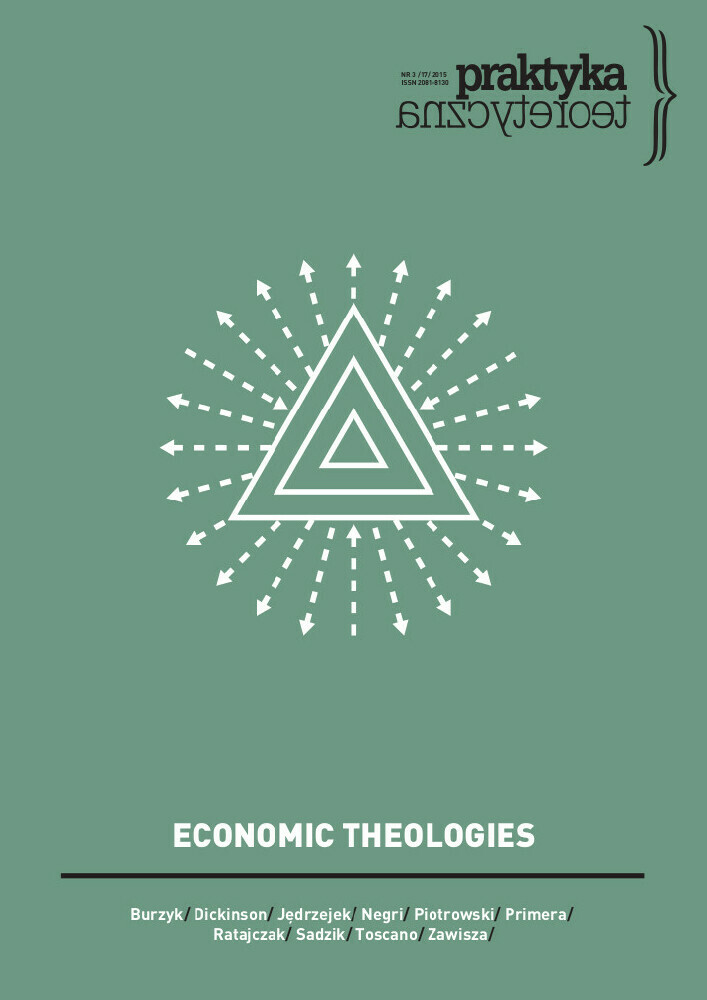Abstrakt
This is an introduction to the issue of “Theoretical Practice” (“Praktyka Teoretyczna”), entitled “Economic Theologies” (no. 3, 2015), edited by Mikołaj Ratajczak and Rafał Zawisza. It contains contextual explanation of the theoretical field projected by the Italian philosopher Giorgio Agamben, namely a critique of the economic theology elaborated on the basis of early Christian theological debates concerning the concept of divine “oikonomia”. The introduction also includes short summaries of the articles, translations and reviews collected in the issue.Bibliografia
Adler, Anthony Curtis. 2014. “Managing the Unmanageable: Agamben’s The Kingdom and the Glory and the Dance of Political Economy.” Concentric: Literary and Cultural Studies 40(2): 149–174.
Agamben, Giorgio. 1993. Infancy and History: On the Destruction of Experience. Trans. Liz Heron. London–New York: Verso.
Agamben, Giorgio. 2005. “Introduzione.” In Coccia, Emanuele. La transparenza delle imagini: Averroè e l’averroismo. Milano: Mondaroni Bruno.
Agamben, Giorgio. 2006. Language and Death: The Place of Negativity. Trans. Michael Hardt, Karen Pinkus. Minneapolis: University of Minnesota Press.
Agamben, Giorgio. 2010. Nudities. Trans. David Kishik, Stefan Pedatella. Stanford: Stanford University Press.
Agamben, Giorgio. 2011. The Kingdom and the Glory: For a Theological Genealogy of Economy and Government. Trans. Lorenzo Chiesa, Matteo Mandarini. Stanford: Stanford University Press.
Agamben, Giorgio. 2013. Highest Poverty: Monastic Rules and Form-of-Life. Trans. Adam Kotsko. Stanford: Stanford University Press.
Agamben, Giorgio. 2014. L’uso dei corpi. Vicenza: Neri Pozza editore.
Agamben, Giorgio. 2015a. Pilate and Jesus. Trans. Adam Kotsko. Stanford: Stanford University Press.
Agamben, Giorgio. 2015b. Stasis: Civil War as a Political Paradigm. Trans. Nicholas Heron. Stanford: Stanford University Press.
Bell Jr., Daniel M. 2010. “’The Fragile Brilliance of Glass:’ Empire, Multitude, and the Coming Community.” Political Theology 11(1): 61–76.
Bielik-Robson, Agata. 2010. “The Broken Constellation: Agamben’s Theology between Tragedy and Messianism.” Telos 152: 103–126.
Cacciari, Massimo. 2013. Il potere che frena: Saggio di teologia politica. Milano: Adelphi.
Cattoi, Thomas. 2010. “A Review of Il Regno e la Gloria: Per una Genealogia Teologica dell’Economia e del Governo. Homo Sacer, II, 2.” Reviews in Religion & Theology 17(2): 211–214.
Chiesa, Lorenzo, and Frank Ruda. 2011. “The Event of Language as Form of Life: Agamben’s Linguistic Vitalism.” Angelaki 16(3): 163–180.
Colilli, Paul. 2008. “The Theological Materials of Modernity (On Giorgio Agamben).” Italica 85(4): 465–479.
Colilli, Paul. 2013. “Late Patrology: The Example of Giorgio Agamben.” Toronto Journal of Theology 29(1): 3–18.
Dickinson, Colby. 2011. Agamben and Theology. London–New York: T. & T. Clark.
Dickinson, Colby, and Adam Kotsko. 2015. Agamben’s Coming Philosophy: Finding a New Use for Theology. London–Lanham: Rowman & Littlefield International, Ltd.
Esposito, Roberto. 2013. Due: La macchina della teologia politicae il posto del pensiero. Torino: Einaudi.
Fagenblat, Michael. 2014. “Liturgy, Sovereignty, or Idolatry: On Recent Work in Political Theology.” Political Theology 15(3): 270–278.
Griffiths, Paul J. 2014. “Share & Share Alike.” Commonweal 141(1): 26–27.
Karsenti, Bruno. 2009. “Agamben et le mystère du gouvernement.” Critique 5(744): 355–375.
Lloyd, Vincent. 2013. “A Critical Introduction to Agamben’s The Kingdom and the Glory.” Political Theology 14(1): 58–64.
Łukaszyk, Ewa. 2015. “Intelektualista jako homo religiosus: Tradycje europejskiej nowoczesności i myśliciele islamu.” In Islam w Europie: Nowe kierunki badań: Księga ku czci Profesor Anny Parzymies, eds. Marta Widy-Behiesse, Konrad Zasztowt. Warszawa: Wydawnictwo Akademickie Dialog, pp. 67–78.
Kaufman, Eleanor. 2008. “The Saturday of Messianic Time (Agamben and Badiou on the Apostle Paul).” South Atlantic Quarterly 107(1): 37–54.
McAleer, G.J. 2014. “A Review of The Kingdom and the Glory: For a Theological Genealogy of Economy and Government, and Adam Smith as Theologian.” Perspectives on Political Science 43(2): 109–111.
McLoughlin, Daniel. 2015. “On Political and Economic Theology: Agamben, Peterson, and Aristotle.” Angelaki 20(4): 53–69.
Pappin, Gladden J. 2014. “Explaining Agamben: Review of The Kingdom and the Glory: For a Theological Genealogy of Economy and Government, The Highest Poverty: Monastic Rules and Form-of-Life, and The Church and the Kingdom.” First Things 239: 57–59.
Reinhard, Kenneth, Eric L. Santner, and Slavoj Žižek. 2013. The Neighbour: Three Inquiries in Political Theology. Chicago–London: The University of Chicago Press.
Scattola, Merio. 2007. Teologia politica. Bologna: Il Mulino.
Schmidt, Christoph. 2014. “The Return of the Katechon: Giorgio Agamben contra Erik Peterson.” Journal of Religion 94(2): 182–203.
Stimilli, Elettra. 2011. Il debito del vivente: Asceci e capitalismo. Macerata: Quodlibet.
Stimilli, Elettra. 2015. Debito e colpa. Padova: Ediesse.
Toscano, Alberto. 2011. “Divine Management: Critical Remarks on Giorgio Agamben’s The Kingdom and the Glory.” Angelaki 16 (3): 125–136.
Virno, Paolo. 2011. E così via, all’infinito: Logica e antropologia. Torino: Bollati Boringhieri.
Virno, Paolo. 2015. When the Word Becomes Flesh: Language and Human Nature. Trans. Giuseppina Mecchia. Cambridge–London: The MIT Press.
Zarader, Marlène. 1990. La dette impensée: Heidegger et l’héritage hébraïque. Paris: Seuil.
Licencja
Autorzy:
„Praktyka Teoretyczna” jest pismem, które chce realizować idee wolnego dostępu do wiedzy i poszerzania domeny dobra wspólnego. Ma służyć rozwojowi nauki i krytycznej refleksji w Polsce i na świecie w imię idei wolnego dostępu do wiedzy (Open Access). Całe pismo jest udostępniane za darmo w Internecie na warunkach licencji CC-BY-NC-SA (Uznanie autorstwa-Użycie niekomercyjne-Na tych samych warunkach 4.0 Międzynarodowe) w wersji 4.0 (szczegółowe warunki: http://creativecommons.org/licenses/by-nc-sa/4.0/). Artykuły w nim zamieszczone mogą być dowolnie przechowywane, kopiowane, drukowane, rozpowszechniane i wykorzystywane do celów naukowo-dydaktycznych przy zachowaniu warunków licencji. Apelujemy tylko o uznanie autorstwa i podanie źródła w myśl przyjętych w środowisku naukowym standardów.
Nie ma natomiast możliwości komercyjnego wykorzystania zgromadzonych zasobów bez pisemnej zgody wydawcy. Dostęp do czasopisma nie może być dystrybuowany za opłatą czy w jakikolwiek inny sposób limitowany przez inne podmioty.
Autorzy tekstów przyjętych do publikacji w czasopiśmie „Praktyka Teoretyczna” są zobowiązani do wypełnienia, podpisania i odesłania na adres redakcji umowy o udzielenie nieodpłatnej licencji do utworów, z zobowiązaniem do udzielania sublicencji CC [PL.pdf, PL.doc, EN.pdf, EN.doc].
Zgodnie z umową, autorzy tekstów opublikowanych w czasopiśmie „Praktyka Teoretyczna” udzielają wydawcy czasopisma niewyłącznej i nieodpłatnej licencji oraz zezwalają na użycie sublicencji Creative Commons Uznanie autorstwa-Użycie niekomercyjne-Na tych samych warunkach 4.0 Międzynarodowe (CC-BY-NC-SA 4.0).
Autorzy zachowują prawa do dalszego, swobodnego rozporządzania utworem.
Autorzy nadsyłanych artykułów powinni upewnić się, czy wykorzystywane przez nich materiały nie są chronione prawami autorskimi na rzecz innych osób i ponoszą odpowiedzialność za ewentualne uchybienia w tym względzie.
